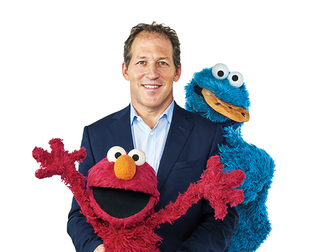
Sesame Workshop
We’re just guessing, but we bet most CEOs of Sesame Workshop haven’t both played rugby and helped keep an East German steel mill going.
The multitalented Steve Youngwood ’91 was interviewed by Lenore Skenazy ’81, founder of Free-Range Kids. The interview has been condensed and edited for clarity.
View full image
To Steve Youngwood ’91, C is for CEO: he became the chair of Sesame Workshop last year. It’s been a long but worthwhile trip. Youngwood graduated from Yale with a history degree, worked in consulting, snagged a Stanford MBA, and then got to Nickelodeon, where he presided over the cable network’s forays into apps, gaming, and social media (otherwise known as the twenty-first century).
Then Sesame Workshop invited him to do the same. He has expanded the Elmo empire to WarnerMedia, Apple, and YouTube; jump-started new projects with everyone from CNN to HBO Max; and introduced new Muppets who can’t be mistaken for Caucasian (or for green): Ji-Young is a Korean American who loves skateboarding, and Elijah and Wes, father and son, are Black. As for Youngwood, he and his family live in Manhattan, blocks from where Sesame Street began.
Lenore Skenazy: Did you grow up watching Sesame Street?
Steve Youngwood: It went on the air in 1969 when I was three months old. I’d be lying if I said I remember all the specifics, but the feeling—it was like a glass of warm milk.
LS: Fast-forward—quite a bit, actually—to Yale. You played rugby. Why?
SY: Many rugby players are frustrated soccer or football players. That’s what happens if you aren’t good enough for varsity.
LS: Do you still play?
SY: We were supposed to have a reunion, and I would say fortunately it was canceled a few weeks ago. I have a screw in this hand and lopsided shoulder over here, all from rugby.
LS: That’s a sport that shaped you, literally. What classes did that?
SY: I learned about the arc of history with [Chinese history professor Jonathan] Spence. And I took an English seminar on the literature of trauma, which sort of climaxed with my senior thesis on the 1925 Immigration Act. All the immigration talk today could have been from a 1924 newspaper.
LS: History repeats itself?
SY: I was always obsessed by the concept of the burden of history. Individual people are burdened by their past, societies are burdened by their past, and you need to balance being a student and not let it paralyze you. That sort of defines my personal life and business life: know the context and be able to adapt.
LS: Tell me something you adapted to.
SY: It was ’91, right after the Berlin Wall had fallen. What could be a more interesting place to go? So I lived with a family, read every book I could about Hitler—
LS: A cheery way to immerse yourself.
SY: And in six months I was fluent enough to get a job with McKinsey. One of my projects was to consult with an East German steel mill. It still had 1944 technology, and they had no right being open, but because of the geopolitical situation it was necessary to save these jobs.
LS: The burden of history.
SY: I still remember the radio in the hotel.
LS: It probably listened to you as much as you listened to it.
SY: I’m going to go on eBay now and find that radio.
LS: Bringing the past into the present. Isn’t that what you’re doing at Sesame Street?
SY: We’re here 50-plus years. We have a north star that guides everything we do. But the way we need to deliver on that mission is constantly changing.
LS: How do you keep up with all the trends?
SY: My kids are 18, 16, and 11. My older kid is a big soccer kid, so I had a lot of car time with him. Seeing him do these Snapchats, taking pictures of half his face and sending them back and forth to his friends—no words and not even a full face!
LS: That’s our future.
SY: My job is to make sure Sesame Street is around for another 50 years.
 loading
loading
1 comment
-

Ron Sipherd, 9:02pm April 28 2022 |  Flag as inappropriate
Flag as inappropriate
The comment period has expired.Might be worth mentioning that my brother Ray Sipherd (YC 1957) was one of the original group of writers for Sesame Street. We used to joke that he was in charge of the letters E, F, and G, and the numbers 3 through 7.
I believe he received two Emmys for his work there.
- Ron Sipherd (YC 1964)